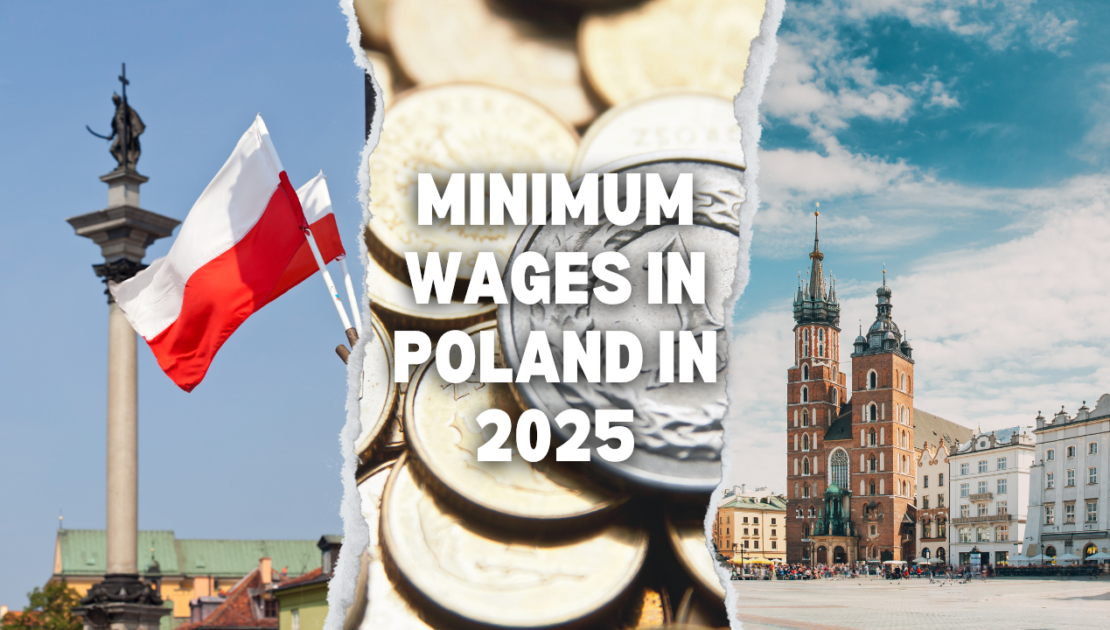- 30 November 2024
- Admin
- No Comments

New Minimum wages in Poland in 2025
Poland’s minimum wage is scheduled to increase starting January 1, 2025, marking a significant step towards improving workers’ financial well-being. This adjustment reflects the government’s commitment to enhancing living standards and addressing the rising cost of living. The wage hike will ensure that employees receive fairer compensation for their work, providing greater financial stability and purchasing power. For employers, it’s an opportunity to contribute to a more equitable labor market while adapting to the updated regulations. This change is expected to have a positive impact on both individuals and the economy as a whole.
What is the minimum wage?
The minimum wage is the legally established lowest amount that an employer must pay to an employee working under an employment or mandate contract. It serves as a critical safeguard, ensuring that workers receive fair compensation for their efforts, regardless of their role or industry. This fundamental guarantee is designed to protect employees from potential exploitation by their employers, setting a baseline standard for wages that promotes equity in the labor market. By mandating a minimum wage, governments aim to improve workers’ living conditions, reduce poverty, and support economic stability, fostering a more just and sustainable work environment for all.
New Minimum wages in 2025
Unlike the previous years, 2023 and 2024, when the minimum wage in Poland saw multiple increases throughout the year, the adjustment in 2025 will occur only once. Effective January 1, 2025, the minimum wage will rise to PLN 4,666 gross per month, marking a significant boost for workers. Additionally, the gross hourly rate will be set at PLN 30.54, ensuring fair compensation for hourly employees. This simplified adjustment process provides clarity and predictability for both employees and employers, reinforcing the government’s efforts to align wages with economic growth and inflation trends. The change aims to enhance financial stability for workers while supporting sustainable economic development.
Gross Vs Net salary
As always, the minimum wage in Poland is quoted as a gross amount. However, what most employees are primarily concerned with is the net amount they will actually take home after taxes and deductions. For 2025, the gross monthly salary of PLN 4,666 translates to an approximate net amount of PLN 3,510.92.
Similarly, the gross hourly rate of PLN 30.54 converts to about PLN 22.95 net per hour. This net amount provides a clearer picture of the real earnings employees can expect to receive in their bank accounts.
Important Note: The exact net amount you receive will depend on several factors. These include whether you have submitted a PIT-2 form, if you work outside your registered place of residence, and any additional deductions specific to your situation.
To calculate your precise net salary for 2025, you can use a free online net-gross salary calculator. These tools take into account your unique circumstances, providing a detailed breakdown of your expected earnings.
Employer Costs and the Minimum Wage
Employees earning the minimum wage may not always be aware of the full cost their employer incurs to hire them. For instance, if your gross salary is PLN 4,666 in 2025, your employer’s total cost will be approximately PLN 5,627. This amount includes mandatory contributions such as social security, health insurance, and other statutory employer obligations.
These contributions are designed to fund essential benefits for employees, such as retirement pensions, healthcare, and social security protections. However, they also mean that the actual cost of employing a worker is significantly higher than the gross salary an employee sees on their paycheck.
This highlights the high level of mandatory contributions in Poland, which can be a challenge for employers, especially smaller businesses. While these contributions play a crucial role in maintaining a robust social safety net, they also underline the gap between what employees receive as net earnings and the overall cost borne by employers. Understanding this dynamic helps both employees and employers appreciate the broader financial implications of employment in Poland.
Future Changes to the minimum Wages
The minimum wage in Poland is reviewed and adjusted annually, ensuring it reflects economic conditions, inflation, and other relevant factors. Changes for the upcoming year are typically announced by September, giving employees and employers time to prepare for the new rates.
Looking ahead, there’s significant news on the horizon. Starting in 2026, Poland will implement new rules for determining the minimum wage, aligning with a directive issued by the European Union. These changes are expected to bring greater transparency and consistency to the wage-setting process, ensuring fairer compensation across the workforce.
The EU directive aims to establish a standardized framework for minimum wage calculations across member states, promoting equity and reducing income disparities. This shift is anticipated to provide more robust protections for workers, particularly those in lower-income brackets, while supporting sustainable economic growth.
The introduction of these new rules marks a pivotal step toward modernizing Poland’s wage policies in line with European standards, benefiting both employees and employers in the long run.
How Does Poland Compare?
According to data from Eurofound, approximately 13% of employees in Poland earn the minimum wage. This figure is notably higher than the European Union average, where about 10% of workers are paid at the minimum wage level. This higher percentage in Poland reflects the broader economic context, as a substantial portion of the workforce in the country relies on minimum wage earnings.
In 2025, Poland’s minimum wage is set at PLN 4,666 gross per month, which is approximately EUR 1,040. While this amount may seem modest compared to wages in higher-income EU countries, it is important to consider the cost of living and purchasing power in Poland, which differs significantly from that in wealthier nations.
If you live in another EU country, it is worth checking how Poland’s minimum wage compares to those in your own country. Minimum wages vary greatly across the EU, with some countries offering much higher levels, while others set more modest rates. These differences are influenced by factors such as economic development, labor market conditions, and regional standards of living.
By comparing minimum wages across Europe, workers can gain a clearer understanding of their earning potential in different countries and make informed decisions about their employment or relocation options.
Summary
Poland’s minimum wage will increase to PLN 4,666 gross per month (PLN 30.54 gross per hour) starting January 1, 2025. This change reflects the government’s effort to enhance workers’ financial stability and address rising living costs. The gross salary translates to a net amount of approximately PLN 3,510.92 per month. While employers incur additional costs due to mandatory contributions, the wage increase is designed to improve living conditions and boost economic growth. Starting in 2026, Poland will adopt new EU regulations for setting the minimum wage, aiming for more transparency and fairness across the EU.










